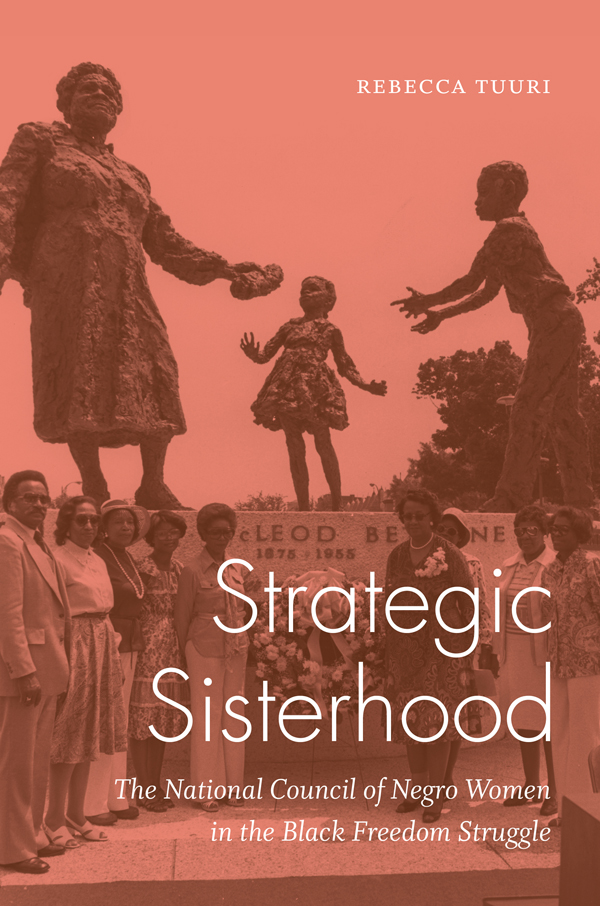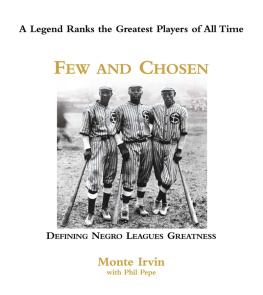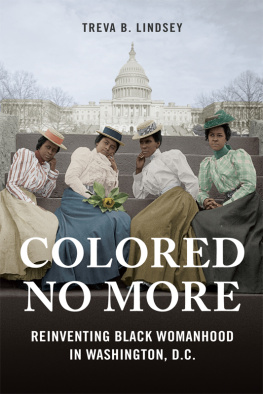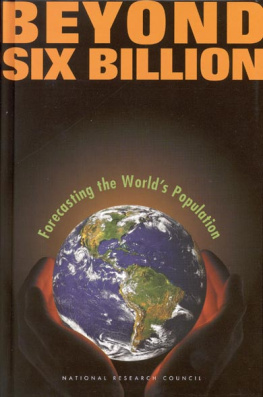Contents
Guide
Pagebreaks of the print version

Strategic Sisterhood
REBECCA TUURI
Strategic Sisterhood
The National Council of Negro Women in the Black Freedom Struggle
The University of North Carolina Press Chapel Hill
This book was published with the assistance of the Authors Fund of the University of North Carolina Press.
2018 The University of North Carolina Press
All rights reserved
Set in Arno Pro by Westchester Publishing Services
Manufactured in the United States of America
The University of North Carolina Press has been a member of the Green Press Initiative since 2003.
Library of Congress Cataloging-in-Publication Data
Names: Tuuri, Rebecca, author.
Title: Strategic sisterhood : the National Council of Negro Women in the black freedom struggle / Rebecca Tuuri.
Description: Chapel Hill : University of North Carolina Press, [2018] | Includes bibliographical references and index.
Identifiers: LCCN 2017044667| ISBN 9781469638898 (cloth : alk. paper) | ISBN 9781469638904 (pbk : alk. paper) | ISBN 9781469638911 (ebook)
Subjects: LCSH : National Council of Negro WomenHistory20th century. | African American womenSocieties and clubsHistory20th century. | African American womenCivil rightsHistory20th century. | Black powerUnited StatesHistory20th century.
Classification: LCC E 185.86 . T 89 2018 | DDC 305.48/896073dc23
LC record available at https://lccn.loc.gov/2017044667
Cover illustration: NCNW leadership laying a wreath at the Mary McLeod Bethune statue in Lincoln Park (unidentified photographer, courtesy of the Mary McLeod Bethune Council House National Historic Site, National Archives for Black Womens History, NCNW Records, series 14, #0484).
Portions of this book were previously published in a different form and are used here with permission. Chapters 2 and 3 include material from This Was the Most Meaningful Thing That Ive Ever Done: The Personal Civil Rights Approach of Wednesdays in Mississippi, Journal of Womens History 28, no. 4 (2016): 89112 (copyright 2016 Journal of Womens History, Inc.). Chapters 5 and 7 include material from By Any Means Necessary: The Flexible Loyalties of the National Council of Negro Women in the Black Freedom Struggle, in U.S. Womens History: Untangling the Threads of Sisterhood , ed. Leslie Brown, Jacqueline Castledine, and Anne Valk, 3248 (New Brunswick: Rutgers University Press, 2017) (copyright 2017 Rutgers, The State University).
To the women of the National Council of Negro Women
Contents
Graph and Map
GRAPH
MAP
Abbreviations in the Text
AAUW
American Association of University Women
ANLCA
American Negro Leadership Conference on Africa
CAA
Council on African Affairs
CAW
Congress of American Women
CCC
Commission on Community Cooperation
CDGM
Child Development Group of Mississippi
COFO
Council of Federated Organizations
CORE
Congress of Racial Equality
CRC
Civil Rights Congress
CSW
Commission on the Status of Women
CUCRL
Council for United Civil Rights Leadership
CWU
Church Women United
HUD
Department of Housing and Urban Development
IWY
International Womens Year
LEAA
Law Enforcement Assistance Administration
LWV
League of Women Voters
MFDP
Mississippi Freedom Democratic Party
MPE
Mississippians for Public Education
NAACP
National Association for the Advancement of Colored People
NACW
National Association of Colored Women
NCCW
National Council of Catholic Women
NCJW
National Council of Jewish Women
NCNW
National Council of Negro Women
NWCCR
National Womens Committee on Civil Rights
NWRO
National Welfare Rights Organization
OEO
Office of Economic Opportunity
PCSW
Presidents Commission on the Status of Women
SCLC
Southern Christian Leadership Conference
SDEDD
South Delta Economic Development District
SDS
Students for a Democratic Society
SNCC
Student Nonviolent Coordinating Committee
TWWA
Third World Womens Alliance
USAID
United States Agency for International Development
WC
Womans Convention
WICS
Women in Community Service
WIMS
Wednesdays in Mississippi; later Workshops in Mississippi
WU
Womanpower Unlimited
YWCA
Young Womens Christian Association
Strategic Sisterhood
Introduction
When Gulfport civil rights activist Sammie Lee Gray-Wiseman finally had the chance to meet Dr. Dorothy Height, the president of the National Council of Negro Women (NCNW, or council), she was excited. It was 1967, and Gray-Wiseman had been working on a new council project to institute a low-income home ownership program in North Gulfport, Mississippi. In order to establish the program, NCNW required that a local section be established in the area first. Once Gray-Wiseman had gathered the necessary signatures and membership dues, NCNW representatives Unita Blackwella black grassroots leader from Mayersville, Mississippiand Dorothy Dukea white housing expert from Lorain, Ohiobegan to search for the site for the new subdivision. Height came down shortly thereafter.
Although Height stayed for less than twenty-four hours, she made a tremendous impact on Gray-Wiseman. Being around her was just like you being in the company of a queen. She spoke very nicely, and she was funny, and [despite being] a lady of her caliber or standards she was as sweet as she could be.
In many recent and influential histories of the postwar black freedom struggle, black middle-class women, such as those who belonged to the NCNW, have been largely overlooked in favor of more visible, outspoken, and radical activists, who took to the streets during the civil rights and Black Power movements. Other important studies have considered only working-class womens activism. The full story of the civil rights movement and the subsequent Black Power movement can only be told by exploring a wide variety of organizations, institutions, and strategies, and recognizing the roles played by middle-class, nationally connected moderates as well as youthful and community-based radicals.
In addition, while recent histories have stressed the importance of local women in fueling and providing the backbone of the civil rights movement, many council women were not only its foot soldiers but also its torchbearers. NCNW women were often the only women at civil rights leadership gatherings or the only black members of women-only groups. Therefore, women in the civil rights movement were not only the backbone of the movement but, at least within the council, its leadership as well.
Despite working through a voluntary womens organization, NCNW women had the political, social, and economic cachet to bring resources to black communities in the mid-twentieth century. Longtime president Dorothy Height served as a leader within important womens organizations, such as Delta Sigma Theta and the Young Womens Christian Association (YWCA) before and during her NCNW presidency. In addition, she served on a variety of important postwar advisory committees, including President Kennedys 1961 Commission on the Status of Women; the Department of Defenses Advisory Committee on Women in the Services; and the White Houses National Commission for the Protection of Human Subjects of Biomedical and Behavioral Research. Both liberal and conservative presidents admired this organization. At the same time, radicals working daily to improve the conditions of life on the ground, such as Brooks and McLaurin in Mississippi, also respected the council.











